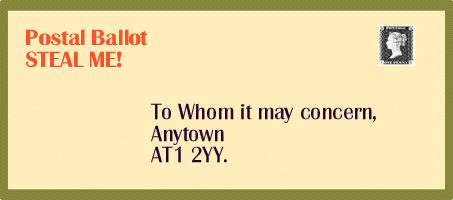| Postal Voting – an open invitation to fraud

Tony Blair started to worry about the 'soft' Labour vote after the 1997 landslide. Labour voters are notoriously difficult to get to a polling station but Blair thought he had found a way round the problem in June 2001 – new rules for postal voting.
Under the previous system, voters had to offer a sound reason why they should receive a postal vote – too ill to go to the polling station, out of the area on election day, etc. But all that was swept away by the Representation of the People Act 2000, which offered postal votes on demand and provided a system which seems almost deliberately engineered to foster fraud.
Blair also created a new quango to oversee postal voting – the Electoral Commission – which was packed with Labour supporters and usual suspects. Blair then proceeded to ignore all warnings of problems in the postal voting arrangements from both his quango and outside experts.
The Problems
Applications for a postal ballot can be made as little as 6 days before polling day and if thousands of applications come in at once, the distribution system breaks down. Worse, applications are sent out by ordinary mail in clearly identifiable envelopes.
A postal ballot does not have to be sent to the voter's address, which encourages criminals to apply for the postal votes of other people and have them sent to an accommodation address.
Each postal ballot has to be accompanied by a Declaration of Identity signed by the voter and a witness but returning officers have neither the time nor the resources for checking whether those signatures which are legible (rather than just a squiggle) are genuine. They are also unable to check if the 'voter' is dead but still on the Electoral Register or an identity invented by a fraudster.
Anyone who gets hold of an unused postal ballot can fill it in and have it accepted by an elections office. Ballots stolen from letterboxes or obtained by bribing postal workers can be misused in this way. Further, it is quite legal for anyone at all to collect ballots from voters and offer to deliver the ballot to an election office. The voter concerned has no control over what happens to his/her ballot on the way to the election office.
Returning officers will accept any ballot which shows votes against candidates even it contains crossings out or any other sort of marking, which allows fraudsters to change ballots after collecting them.
 Further, returning officers have no powers to investigate fraud and no duty in law to do so. So if someone turns up at a polling station and is refused the chance to vote because a postal vote has been issued in that person's name, that's it. The person can complain until they are blue in the face but nothing will be done. Further, returning officers have no powers to investigate fraud and no duty in law to do so. So if someone turns up at a polling station and is refused the chance to vote because a postal vote has been issued in that person's name, that's it. The person can complain until they are blue in the face but nothing will be done.
The Blair government has moved beyond complacency to denial on the fraud issue. The official word is that the system "remains robust, safe and secure" and police forces up and down the country have consistently failed to provide either control of fraud or diligent investigation of fraud allegations.
In Practice
Following the local government elections in June 2004, allegations of fraud were made all over the country, e.g. in Bradford, Birmingham, Burnley, Derby, Halifax, Oldham, Preston, Reading, Woking and various parts of Cheshire and Greater Manchester.
A special election court chaired by Richard Mawrey QC has taken a whole year to find 6 Birmingham councillors; Muhammad Afzal, Mohammed Islam, Mohammed Kazi (of Aston), Shafaq Ahmed, Shah Jahan and Ayaz Khan (of Bordesley Green); guilty of vote-rigging. The police actually found the Aston gang at work altering ballots in a warehouse but all they did was accept the silly story which they were told and deliver the bogus ballots to the local election office!
The police and the Can't Prosecute Service have yet to take any action against election fraudsters.
In his report, Mr. Mawrey quoted an official Government statement, which ran: "There are no proposals to change the rules governing election procedures for the next election, including those for postal voting. The systems already in place to deal with electoral fraud are clearly working."
Mr. Mawrey commented: "Anyone who has sat through the case I have just tried and listened to the evidence of electoral fraud that would disgrace a banana republic would find this statement surprising."
He added: "(It is) a statement not simply of complacency but of denial."
The official Government response to Mr. Mawrey's report is that he is being alarmist and there is nothing to worry about.
May 2005
Fraud in earlier elections was accompanied by threats of violence, death and deportation (to recent immigrants). There are clearly a lot of people ready and willing to ensure that their party wins by any means, and confident that official action is unlikely to be taken against them.
In some constituencies, one-quarter of all votes cast in the general election could be postal votes, which will make stealing first place by means of postal voting fraud eminently possible. Which raises the spectre of a bonanza for the legal profession as every unsuccessful candidate insists on a scrutiny of the postal votes to find out if he/she has been cheated by fraudsters.
Parting Thoughts
Tony Blair's Big Idea for his first term was his Millennium Dome and celebrating a bogus millennium change one year early. His Big Idea for term #2 was to lie to the nation to start an illegal war in Iraq. Could stealing a third term through serial postal voting fraud be his next Big Idea?
 The reason why some people try to rig elections is for the money. A councillor in Birmingham, for instance, gets an annual salary/allowances of £14,000 for doing the basic job or £46,000 for being a member of the 'cabinet'. And anyone who slithers into enough quangos and committees can expect a top whack of £100,000 per year. The reason why some people try to rig elections is for the money. A councillor in Birmingham, for instance, gets an annual salary/allowances of £14,000 for doing the basic job or £46,000 for being a member of the 'cabinet'. And anyone who slithers into enough quangos and committees can expect a top whack of £100,000 per year.
 New Labour's official 'champion of choice' for postal voting is the deputy prime minister, Johnny Two Jags Prescott. 'Nuff said! New Labour's official 'champion of choice' for postal voting is the deputy prime minister, Johnny Two Jags Prescott. 'Nuff said!

 | Note: This report was compiled according to official New Labour standards of accuracy and verification. |  |
|



